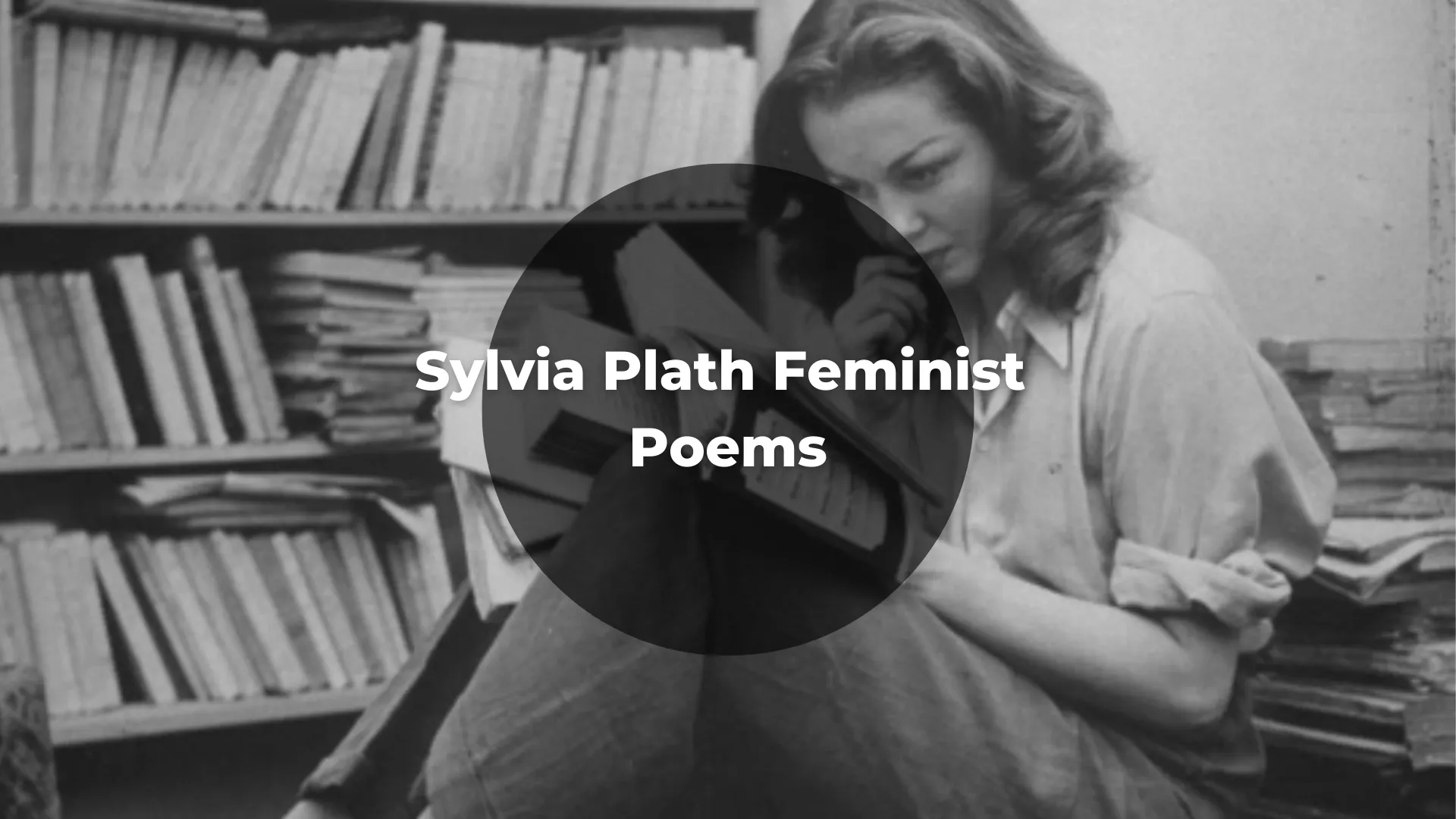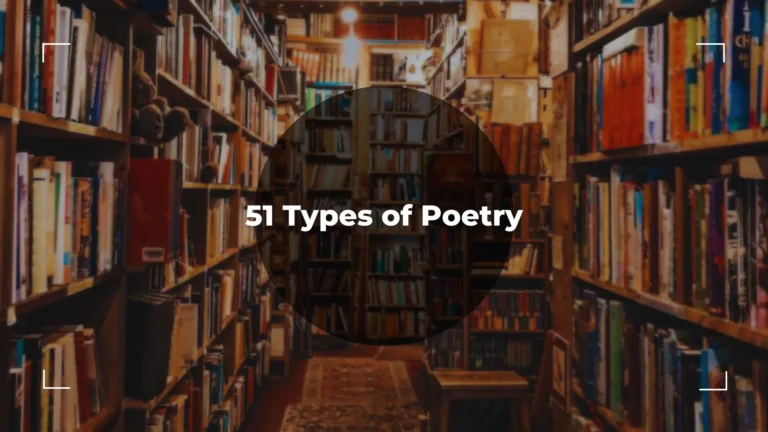6 Best Sylvia Plath Feminist Poems – An Ultimate List
In the dimly lit corridors of literary history, one name shines brightly, not only as a remarkable poet but also as an icon of resilience in the face of adversity. Sylvia Plath, a name synonymous with profound and raw emotion, remains an enduring figure in the world of poetry. But beyond her captivating verses lies a deeper narrative, one that speaks to the heart of feminism.
Join us on a journey through the hauntingly beautiful landscapes of Plath’s poetic universe as we uncover the feminist themes that pulse within her lines.
In this exploration, we’ll delve into the life, works, and indomitable spirit of Sylvia Plath, revealing how her words continue to empower and inspire, touching the very core of human experience.
List of Sylvia Plath Feminist Poems
Sylvia Plath’s poetry is a vivid tapestry of words that unveils the complex and multifaceted experiences of women in the mid-20th century. Her verses resonate with raw emotion, unflinching honesty, and a deep exploration of the female identity. Let’s explore a curated list of Sylvia Plath’s feminist poems, where her voice rises as a powerful anthem for women’s empowerment and self-discovery.
1. “Lady Lazarus”
Plath’s “Lady Lazarus” is a fierce declaration of resilience and rebirth. The poem delves into the theme of overcoming personal struggles, serving as a triumphant voice against societal expectations.
2. “Ariel”
“Ariel” is a lyrical masterpiece that showcases the pursuit of freedom and self-expression. Plath’s poetic imagery takes flight, capturing the exhilaration and defiance of a woman breaking free from constraints.
3. “Daddy”
In “Daddy,” Sylvia Plath grapples with the complexities of patriarchy, familial bonds, and the quest for independence. The poem is a searing reflection on the oppressive forces women often face.
4. “The Applicant”
Plath’s “The Applicant” delves into the societal pressures on women to conform to prescribed roles. The poem presents a satirical examination of gender expectations, exposing the dehumanizing aspects of conformity.
5. “Tulips”
“Tulips” explores the concept of self-identity and the desire to break free from domesticity. Plath’s vivid descriptions of the titular flowers symbolize the persistent reminders of traditional gender roles.
6. “Morning Song”
“Morning Song” is a tender and intimate exploration of motherhood and the complex emotions it entails. Plath’s reflective verses capture the transformative journey of becoming a mother.
These poems, among others in Sylvia Plath’s body of work, exemplify her ability to encapsulate the inner worlds of women and the challenges they faced during her era. Through her powerful verses, Plath confronts societal norms, emotional turmoil, and the quest for self-discovery, ultimately contributing to the feminist literary canon with her resounding voice.
Analysis of Key Feminist Themes in Sylvia Plath’s Poetry
Sylvia Plath’s poetry serves as a rich tapestry of the female experience, intertwining threads of resilience, rebellion, and self-discovery. In this section, we’ll unravel the intricate layers of feminist themes that permeate her verses, shedding light on the powerful commentary she offered through her poetry.
Female Identity and Autonomy: Plath’s poetry often explores the struggle for female identity and autonomy. Her verses echo the sentiments of women who yearn to break free from societal constraints and carve out their own paths.
Confronting Patriarchy: Central to Plath’s work is the fearless confrontation of patriarchy. In poems like “Daddy,” she tackles the impact of oppressive male figures and the need to liberate oneself from their shadow.
Emotional Turmoil and Resilience: Plath’s personal battles with mental health are woven into her poetry. Her work captures the emotional turmoil experienced by many women while also celebrating their strength and resilience.
Domesticity and Rebellion: The poems often delve into the confines of domestic life and the internal rebellion that simmers beneath the surface. “Tulips” is a prime example of Plath’s exploration of the desire to break free from domestic norms.
Motherhood and Self-Discovery: In “Morning Song” and other poems, Plath portrays the complexities of motherhood, showcasing the transformative journey women undertake as they become mothers.
The Body as a Battleground: Plath’s poems also touch on the idea of the body as a battleground, addressing issues of body image, self-esteem, and the societal pressures placed on women to conform to certain physical ideals.
Sylvia Plath’s ability to blend vivid imagery with raw emotion makes her work a compelling and introspective exploration of these themes. Her poems resonate not just with women of her era but continue to strike a chord with modern readers, making her a timeless voice in feminist literature.
Understanding Sylvia Plath’s Writing Style
Sylvia Plath’s writing style is an artistic manifestation of her innermost thoughts, unfiltered and vividly expressive. In this section, we’ll delve into the distinct features that define her prose and poetry, shedding light on what makes her literary style truly exceptional.
1. Raw Emotional Intensity
Plath’s writing is a whirlwind of raw emotions. Her words carry the weight of her personal struggles and triumphs, allowing readers to immerse themselves in the depth of her feelings.
2. Vivid Imagery and Symbolism
Her poetry is often marked by striking imagery and symbolism. She weaves metaphors and symbols into her work with precision, giving life to abstract concepts and emotions.
3. Confessional Poetry
Plath is often associated with confessional poetry, a genre that involves deeply personal and often autobiographical content. She bares her soul on the page, inviting readers to share in her experiences.
4. Precision in Language
Plath’s use of language is precise and evocative. Her words are carefully chosen to create an impact, leaving a lasting impression on the reader.
5. Themes of Darkness and Light
Her writing often navigates the fine line between darkness and light. She explores themes of despair and hope, making her work a study in contrasts.
6. Feminist Subtext
In her feminist poems, Plath’s writing style takes on a distinct quality. She employs her trademark intensity to shed light on the struggles and aspirations of women, creating powerful feminist subtext.
7. Emotional Resonance
One of the most remarkable aspects of Plath’s style is its ability to resonate with readers on a deeply emotional level. Her honesty and vulnerability create a profound connection between her and her audience.
Sylvia Plath’s writing style is a testament to the power of words to convey the complexity of human experience. Her work continues to captivate readers, drawing them into her world and leaving an indelible mark on their hearts and minds.
Conclusion
As we journey through the realms of Sylvia Plath’s feminist poetry and her unique writing style, we’re reminded that her words transcend time, echoing through generations. Sylvia Plath, a literary luminary, stands as an enduring figure in feminist literature, her verses both a reflection of her own struggles and an emblem of resilience for countless women.
Her feminist themes, exploring identity, rebellion, and the female experience, continue to spark conversations in our contemporary world. Plath’s work remains a poignant reminder that literature has the power to amplify silenced voices and challenge societal norms. In a world where the pursuit of equality and self-discovery remains as relevant as ever, Sylvia Plath’s legacy shines brightly.
Her confessional style, rich symbolism, and fearless confrontation of oppressive forces make her an artist who not only wrote with her heart but also touched the hearts of countless readers.
As we celebrate her contributions to feminist literature, we invite you to dive deeper into Sylvia Plath’s poems and discover the unending relevance of her words in the ongoing discourse on gender, identity, and the universal quest for equality.
About the Poet

Sylvia Plath (1932-1963) was an American poet, novelist, and short-story writer known for her profound impact on modern literature. Born in Boston, Massachusetts, she experienced both personal and artistic tumult, which heavily influenced her work. Plath’s writing, characterized by raw emotion, vivid imagery, and a confessional style, delved into themes of feminism, identity, and mental health. Her most notable works include “The Bell Jar,” a semi-autobiographical novel, and a collection of poems in “Ariel.”
Plath’s exploration of female experiences and her fearless confrontation of societal norms made her a prominent figure in feminist literature. Tragically, Sylvia Plath’s life was cut short at the age of 30, but her words continue to resonate, inspiring readers and contributing to ongoing discussions of gender, identity, and the human experience.
“We hope you’ve found our exploration of Sylvia Plath’s feminist poems and her enduring legacy both enlightening and inspiring. The beauty of literature lies in its ability to ignite conversations and connect people from all walks of life. We’d love to hear your thoughts, personal insights, and experiences related to Sylvia Plath’s work, feminism, or any other related topics. Please feel free to leave your comments below and join the conversation.
Share your perspective, and let’s continue to unravel the layers of her powerful verses together. If you’ve found this content valuable, don’t hesitate to share it on your favorite social media platforms, spreading the knowledge and inviting others to engage in this literary journey. Your participation enriches our community, making it a space where diverse voices come together to celebrate the enduring impact of writers like Sylvia Plath.” – Your Book Corner


